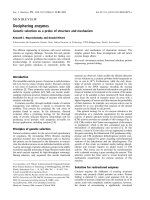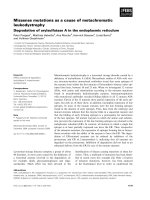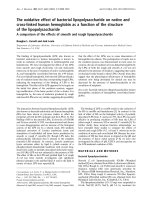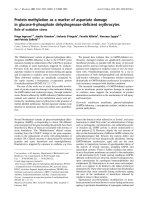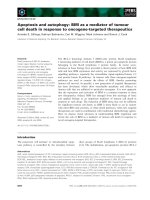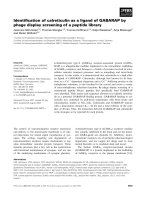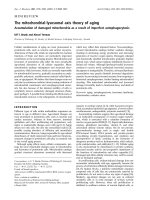Personal importance as a moderator of appraisal emotion relationships
Bạn đang xem bản rút gọn của tài liệu. Xem và tải ngay bản đầy đủ của tài liệu tại đây (515.38 KB, 72 trang )
PERSONAL IMPORTANCE AS A MODERATOR OF APPRAISALEMOTION RELATIONSHIPS
KANIKA BATRA
B.A. (Hons.) Psychology, University of Delhi, India
A THESIS SUBMITTED FOR THE DEGREE OF
MASTER OF SOCIAL SCIENCES
DEPARTMENT OF PSYCHOLOGY
NATIONAL UNIVERSITY OF SINGAPORE
2011
i
ACKNOWLEDGEMENTS
I would like to extend my most sincere gratitude to my supervisor, Dr Tong Mun Wai
Eddie, for his suggestions, encouragement and guidance throughout my graduate studies. I
greatly appreciate his support and understanding.
I would also like to express my appreciation for my friends Li Neng, Ranjith, Yu Hui,
Yonghao, and Smita for their suggestions and for being ever so ready to answer and discuss
any issues.
In addition, I would like to thank my family, especially my mother. Without her love
and support it would not have been possible.
Last but not the least I would like to extend my deepest gratitude to my good friends
Manisha and Richa for always being there in tough times.
ii
TABLE OF CONTENTS
PAGE
ACKNOWLEDGEMENTS
i
TABLE OF CONTENTS
ii
SUMMARY
iv
LIST OF FIGURES
v
LIST OF TABLES
vi
LIST OF APPENDICES
vii
CHAPTER ONE
INTRODUCTION
1
Appraisal Theories
4
Appraisal-Emotion Relationships
6
Anger and Sadness
8
Personal Importance as Moderator
9
Present Research
12
CHAPTER TWO
EXPERIMENT 1
Method
Results
15
15
Participants
15
Procedure
15
Measures
17
18
iii
Discussion
23
CHAPTER THREE
EXPERIMENT 2
Method
27
28
Participants
28
Procedure
28
Measures
30
Manipulation check items
31
Results
31
Discussion
35
CHAPTER FOUR
GENERAL DISCUSSION
39
Summary of the Findings
39
Theoretical Importance of Findings
40
Limitations and Future Directions
41
Conclusion
43
REFERENCES
45
APPENDICES
56
iv
SUMARRY
Past research on appraisal theories has shown that the appraisal of agencyothers is associated with anger and the appraisal of agency-circumstances is
associated with sadness. Research has also revealed that personal importance is
vital in emotions such as anger and sadness. However, there has been no research
so far on the role of personal importance as a moderator of appraisal-emotion
relationships, specifically the relationship between agency-others and anger and
the relationship between agency-circumstances and sadness. To fill this gap, two
experiments were performed. In Experiment 1, results showed that personal
importance moderated the relationship between agency-others and anger,
however, the relationship between agency-circumstances and sadness did not vary
as a function of personal importance. To further investigate the hypotheses,
valence (positive and negative) condition was added in Experiment 2. In positive
valence condition participants received a positive feedback on a task given to
them whereas in negative valence condition participants received a negative
feedback on the given task. In Experiment 2, participants were randomly assigned
to either a positive valence condition or a negative valence condition, in
comparison to Experiment 1 where participants were only assigned to the negative
valence condition. In addition, personal importance was also manipulated in
Experiment 2 with two conditions (i.e. high personal importance and low personal
importance). Results of Experiment 2 revealed that the relationship between
agency-others and anger did not vary with personal importance whereas the
relationship between agency-circumstances and sadness was moderated by
personal importance. However, valence did not moderate the appraisal-emotion
relationships as predicted.
v
LIST OF FIGURES
PAGE
Figure 1.1: Estimated regression lines for anger regressed
onto agency-others across low and high levels of personal
importance (Experiment 1).
20
Figure 1.2: Estimated regression lines for anger regressed
onto personal importance across low and high levels of
agency-others (Experiment 1).
21
Figure 1.3: Estimated regression lines for sadness regressed
onto agency-others across low and high levels of personal
importance (Experiment 1).
23
Figure 2.1: Estimated regression lines for sadness regressed
onto agency-circumstances across low and high levels of
personal importance (Experiment 2).
34
vi
LIST OF TABLES
PAGE
Table 1
Regression results for Anger as dependent variable (Experiment 1)
26
Table 2
Regression results for Sadness as dependent variable (Experiment 1)
26
Table 3
Regression results for Anger as dependent variable (Experiment 2)
37
Table 4
Regression results for Sadness as dependent variable (Experiment 2)
38
vii
LIST OF APPENDICES
PAGE
Appendix A: List of Words as presented in Synonym Test in
Experiment 1 and Experiment 2
56
1
CHAPTER ONE
INTRODUCTION
In life, all humans experience both good and bad times and various
emotions at different points. One feels happy when spending time with loved
ones, feels sad upon losing a loved one, and feels angry when personal wishes are
obstructed. Emotions such as anger, joy and sadness in part result from how
events are appraised. For example, after scoring below average for an exam, a
student might feel sad if he appraises his low scores as a loss caused by a heavy
rain before the exam, an event not in his control, or he might feel angry if he
blames the invigilator for disturbing his concentration during the exam. In this
example, the rain before exam illustrates agency-circumstances appraisals
whereas, the disturbance by invigilator illustrates agency-other appraisals. Thus,
an emotion arises depending upon the evaluation or appraisal of the event. A
critical question would be whether the perceived personal importance of a
situation plays a role in the effect of such appraisals on the elicitation of emotions.
Would one still be emotionally affected by appraisals if the situation did not
matter to him/her? In the context of the same example, would the student still feel
anger or sadness after appraising the event as caused by others or by impersonal
factors, respectively, if the exam was not really important to him?
Appraisal theories predict that people evaluate events along a set of
appraisal dimensions such as who or what is responsible for the situation and
whether the situation is pleasant or unpleasant and that specific emotions would
result depending on the outcomes of these appraisals (Ellsworth & Scherer, 2003;
Lazarus, 1991). To be accurate, appraisal theorists do not completely agree on the
2
appraisals associated with particular emotions. For example, according to Smith
and Ellsworth (1985), anger is associated with the appraisals of human control,
certainty, and other responsibility, whereas Frijda, Kuipers, and ter Schure (1989)
posited that anger is associated with appraising the situation as unpleasant,
important, unfair, certain, and caused by the other person. Although appraisal
theorists differ in their postulation of which appraisals should be associated with
which emotions, they all agree on the primary principle that a specific appraisal
pattern is associated with a specific emotion and by large, there is substantial
overlap between these theories in their predictions of appraisal-emotion
relationships (Frijda et al., 1989; Roseman, 1984; Smith & Ellsworth, 1985; Smith
& Lazarus, 1993).
The idea that each emotion is associated with a specific set of appraisals is
supported by strong empirical evidence (Roseman & Smith, 2001; Scherer, 1984;
Smith & Ellsworth, 1985). Some appraisal theorists view these appraisal-emotion
relationships as strong and fixed, and should be same for all individuals (Roseman
& Smith, 2001). On the contrary, other appraisal theorists proposed that there
exist individual differences in the relationships between appraisals and emotions.
Research has generated support for the view that appraisal-emotion relationships
are not invariant, suggesting that two individuals may still experience different
emotions even if they appraise an event in the same way (Kuppens & Tong,
2010). However, there is still lack of research examining how the relationships
between appraisals and emotions might differ.
The present research work aspires to examine how personal importance
moderates appraisal-emotion relationships. Note that personal importance can be
construed as an individual difference variable or as a manipulated state. Appraisal
3
theorists have argued that personal importance is a primary motivation, stating
that there would only be an emotional response to an event if an individual has a
personal stake in the event (Lazarus, 1991). The appraisal of personal importance
aids in the interpretation of the environment that helps in deciding what needs
immediate attention and hence action. A large body of research has revealed that
personal importance affects a wide range of psychological phenomena, such as
prospective memory, persuasion, and attitude change (e.g. Kanfer & Ackerman,
1989; Kliegel, Martin, McDaniel, & Einstein, 2001; Krosnick & Schuman, 1988;
Petty & Cacioppo, 1984;). However, to the best of my knowledge, although there
had been research on how personal importance affects emotions (Lazarus, 1991;
Smith & Pope, 1992), no research has focused on the moderating effects of
perceived personal importance on appraisal-emotion relationships and my
research aims to fill this gap.
To examine the above mentioned hypothesis, I focused on anger and its
associated appraisal of agency-others (i.e. whether others are responsible for an
event), and sadness and its associated appraisal of agency-circumstances (i.e.
whether impersonal or external situations are responsible for an event).
My research examined how personal importance moderates the association
between agency-others and anger and the association between agencycicumstances and sadness. To test these hypotheses, I conducted two experiments.
In Experiment 1, I had participants undertake a synonym test in which negative
feedback was provided to all participants after the test. I predicted that the
appraisal-emotion relationships mentioned previously would differ depending on
the level of measured personal importance attributed to the synonym test. In
Experiment 2, personal importance was manipulated. I predicted that the results of
4
Experiment 2 would replicate those in Experiment 1 although in Experiment 2. In
addition, I also manipulated valence of the test by providing positive or negative
feedback to the participants. Anger and sadness determine agency appraisals of
negative events and not of positive events (Keltner, Ellsworth and Edwards,
1993). This suggests that reversing these effects agency appraisals might influence
the corresponding emotion only in events of congruent valence. Based on this, I
predicted that the above mentioned appraisal-emotion relationships would vary as
a function of both personal importance and valence.
Appraisal Theories
According to componential appraisal theories, the explanation of why
different people experience different emotions in the same event lies in the way
they evaluate the event (Roseman & Smith, 2001). These theories also propose a
specific set of appraisal dimensions, such as pleasantness (whether the event is
pleasant or unpleasant), certainty (whether an event is certain or uncertain),
control (whether one has control over the event) and agency, which when
combined should elicit specific emotion (e.g., anger, sadness, guilt, joy). For
example, one feels angry upon appraising an event as unpleasant and caused by
other individual but one feels sad about an unpleasant event perceived as caused
by impersonal circumstances (e.g., Arnold, 1960; Ellsworth & Scherer, 2003;
Frijda, 1986; Lazarus, 1991; Ortony, Clore, & Collins, 1988; Roseman, 1984;
Scherer, 1984; Smith & Ellsworth, 1985).
Many studies have provided empirical support for appraisal theories by
showing that people’s evaluations of their situations are associated with particular
5
emotional reactions (e.g. Ellsworth & Scherer, 2003; Lazarus, 1991; Roseman,
1984; Smith & Ellsworth, 1985). To examine the appraisal dimensions associated
with distinct emotional experiences, researchers have mostly relied upon methods
that induce appraisals and employed self-report measures. For example, in some
studies, participants recalled personal events in which they experienced specific
emotions and then indicated how they appraised these events (e.g. Folkman &
Lazarus, 1988; Fitness & Fletcher, 1993; Mauro, Sato, & Tucker, 1992; Scherer,
1997; Roseman, Antoniou, & Jose, 1996; Roseman, Spindel, & Jose, 1990;
Tesser, 1990). In other studies, participants were provided with vignettes and were
instructed to report their appraisals and emotional responses to the vignettes (e.g.,
Kuppens, Van Mechelen, Smits, deBoeck, & Ceulemans, 2007; Smith, Haynes,
Lazarus, & Pope, 1993; Tong, Ellsworth, & Bishop, 2009). In addition,
researchers may also ask participants to rate their appraisals and emotional
experiences in naturally occurring situations (e.g. Folkman & Lazarus, 1985;
Pecchinenda, Kappas, & Smith, 1997; Smith, 1989; Tong, 2010). For instance,
Smith and Ellsworth (1987) asked the participants to rate their appraisals and
emotions just before the start of a college examination and also immediately after.
Although the range of studies supporting appraisal theories have been
fairly notable, they only focused on the general assumption that appraisal-emotion
relationships are fixed and do not vary across individuals (Roseman & Smith,
2001; Smith & Pope, 1992). There are few studies that investigated individual
differences in appraisal-emotion relationships. In particular, no research has
examined whether an individual’s perception of the importance of the situation
might affect how emotions are related to appraisals.
6
Appraisal-Emotion Relationships
Although researchers generally agree on specific associations of appraisals
with emotions, there have been two contradictory viewpoints on whether such
relationships are invariant. One perspective states that the relationships between
appraisal dimensions and emotions are fixed whereas the other perspective claims
that appraisal-emotion relationships vary. The first perspective indicates that the
relationships between specific appraisals and emotions should not differ across
individuals (Roseman & Smith (2001). This view was derived from evolutionary
perspectives indicating that universally shared emotions are adaptive to human
survival and are passed down to all humans. Since appraisals are the antecedents
of emotions, their effects on emotions should be invariant across all individuals.
Cross cultural studies support this viewpoint as people from different cultures
have been found to exhibit similar appraisal-emotion relationships. For instance,
in a study by Scherer (1997), participants from 37 countries were found to show
similar appraisal patterns for emotions such as sadness, joy, anger, disgust, fear,
guilt and shame. In addition, research by Smith and Kirby (2004) implies that the
appraisals of motivational relevance, motivational congruence, and otheraccountability are essential for anger such that in the absence of anyone of these
appraisals, anger may not be experienced. For instance, other-accountability may
induce gratitude instead of anger in the absence of motivational relevance and
motivational congruence. Hence, the relationships between appraisals and
emotions are thought to be fixed and invariant.
In contrast, the second perspective suggests that there are individual
differences in the magnitude of appraisal-emotion relationships. Interestingly, one
of the early objectives for the development of appraisal theories was to identify
7
individual differences in emotional experiences (Arnold, 1960; Smith & Pope,
1992). Past studies have found evidence of strong individual differences in
chronic appraisal patterns (Tong et al., 2006). Consistently, studies have also
found individual differences in attribution styles (Robins, 1988; Dodge, 1980) and
in some social cognitive processes, such as entity versus incremental processes
(Dweck, 1986).
More importantly, many studies have demonstrated that the relationships
between appraisal patterns and emotions are not constant. For example,
individuals high in frustration tolerance may appraise the situation as frustrating
without feeling angry (Buss, 2004). Importantly, there is accumulating evidence
that some individuals exhibit stronger appraisal-emotion relationships than others.
This has been demonstrated using various methods such as momentary experience
sampling (Nezlek, Vansteelandt , Van Mechelen, & Kuppens, 2008; Tong, 2010)
and imagery techniques (Kuppens et al., 2007; Kuppens, Van Mechelen, &
Rijmen, 2008). For instance, individuals high in trait anger were found to show
stronger relationships between anger-related appraisals (e.g. appraising events as
caused by someone else and unfairness) and anger than individuals low in trait
anger (Kuppens et al., 2007). In addition, research on affective memory networks
suggest that memory networks associated with emotions of similar valence vary
across individuals. For example, there is evidence indicating that individuals high
in trait anger tend to have stronger associations between negative affective nodes
(Eckhardt & Cohen, 1997). Thus, existing evidence suggests that the relationships
between appraisals and emotions may not be invariant.
However, there is still a lack of research on what variables might account
for the individual differences in appraisal-emotion relationships. My research
8
focuses on filling this gap by investigating personal importance as a possible
moderator of appraisal-emotion relationships. I now discuss the appraisal-emotion
relationships that I have chosen to examine in my studies and also the possible
role of personal importance in moderating these relationships.
Anger and Sadness
To test the moderating effects of personal importance on appraisalemotion relationships, I have selected anger and its associated appraisal of
agency-others and sadness and its associated appraisal of agency-circumstances.
According to attribution research, anger can occur in the midst of a failure but
only when the failure is attributed to or blamed on another person (Russell &
McAuley, 1986). According to appraisal theories, one feels angry when something
unwanted or unfair happens and is caused by another person. On the other hand,
agency-circumstances distinguishes sadness from other emotions. The belief that a
negative situation is controlled by impersonal circumstances and that nothing can
be done to rectify it is crucial in the elicitation of sadness; e.g., sadness felt at the
death of a loved one (Smith & Ellsworth, 1985).
Many appraisal studies have found anger to be associated with agencyothers and sadness to be associated with agency-circumstances (Frijda et al., 1989;
Smith & Ellsworth, 1985; 1987; Tong et al., 2007). For example, Ellsworth and
Smith (1988) asked participants to recall unpleasant emotional experiences and
rate their experiences along several appraisal dimensions and emotions. The
results indicated the strongest amount of reported anger in the descriptions of
upleasant situations in which someone else was perceived as responsible, and the
9
strongest amount of reported sadness in the descriptions of the unpleasant
situations in which impersonal circumstances were perceived as responsible. In
conclusion the above presented evidence shows the association of anger and
sadness with agency-others and agency-circumstances respectively. However,
there is no research on how these relationships differ as a function of personal
importnce. Therefore,the current research aims to examine the moderating effects
of personal importance on the relationship between anger and agency-others and
on the relationship between sadness and agency-circumstances.
Personal Importance as Moderator
The possibililty that personal importance is an important variable in
appraisal-emotion processes was first suggested by Arnold (1960). It was
introduced as motivational relevance by Lazarus (1966) as one of the primary
appraisals. Personal importance holds a central role in all subsequent appraisal
theories and has been discussed under different labels by various appraisal
theorists, such as motive consistency (Roseman, 1984, 2001) , concern relevance
(Scherer, 1982, 1984), and importance (Smith & Ellsworth, 1985).
Personal importance is vital as it signals the extent to which the situation
puts an individual’s survival and adaptation in danger (Ellsworth & Scherer,
2003). Lazarus (1991) proposed knowledge and personal importance as the most
important elements underlying cognitive processes in emotion. Knowledge is an
understanding about a subject in general and in a specific encounter. While
knowledge plays a critical role in compelling the individual to take appropriate
actions in the face of threat, it is the evaluation of the importance of the situation
to oneself that makes the situation emotional (Lazarus, 1991). Without a high
10
level of personal importance, knowledge would be non-emotional (Folkman,
Schaefer, & Lazarus, 1979). Thus, personal importance has been posited as
necessary for any emotional response to occur, and the degree of personal
importance predicts one’s level of affective involvement. Emotion would only be
possible, whether anger or sadness, if the situation is perceived as important
(Smith & Lazarus, 1990; Smith & Pope, 1992). Thus, personal importance is an
important variable in generating emotions. Much evidence has supported the
relationships between personal importance and emotional experiences (Bennett,
Lowe, & Honey, 2003; Ellsworth & Smith, 1988; Parkinson, 1999, 2001;
Parkinson, Roper, & Simons, 2009; Smith & Ellsworth, 1987).
In addition, to reinforce the point that personal importance is critical to
appraisal-emotion processes, the motivational principle proposed by Lazarus
(1991) emphasizes the primary role of motivation in defining harms and benefits
to an individual. Hence, individual differences in motivation is central because
variations in motives across situations and individuals would contribute to the
diversity in emotional experience. This implies that the same situation can benefit
one individual but threaten another. Following this principle, the emotional
response of one individual should be different depending on the level of personal
importance assigned to the situation. Hence, one can expect individual differences
in appraisal-emotion relationships that are explained by personal importance.
Personal importance is also considered as central in other research areas.
For instance, according to the self-evaluation maintenance model, individuals try
to achieve a task or goal to maintain their positive evaluation of themselves and
hence, are more likely to work harder towards a task that is perceived as
personally important (Tesser & Campbell, 1983; Tesser, 1988). Consequently, if
11
the task is perceived as important, individuals are more likely to allocate more
attention to their performance (Kanfer & Ackerman, 1989; Kanfer, Ackerman,
Murtha, Dugdale, & Nelson, 1994) and perform better (Seijts, Meertens, & Kok,
1997). Thus, one can expect individual differences in task performance between
individuals who perceive the task as personally important and those who do not
perceive the task as personally important. Moreover, Kliegel et al. (2001) posited
that the perceived importance of a memory task should influence the prospective
memory. Their work also suggests that the effect of importance on prospective
memory has practical relevance in everyday life; appointments that are considered
to be important might be more likely to be kept.
Personal importance has also been studied in persuasion and attitude
change (Cialdini, Levy, Herman, Kozlowski, & Petty, 1976; Petty & Cacioppo,
1979a, 1979b). The elaboration likelihood model of persuasion posits personal
importance as a significant antecedent of persuasion and attitude change (Petty &
Cacioppo, 1986). People pay more attention to arguments that are personally
important which in turn are more likely to lead to the central route to persuasion
(Petty, Cacioppo, & Goldman, 1981). Many studies have found evidence of the
effects of personal importance in persuasion and attitude change (Burnkrant &
Howard, 1984; Chaiken & Maheswaran, 1994; Krosnick & Schuman, 1988; Petty
& Cacioppo, 1984). For instance, Claypool et al. (2004) examined personal
importance as a moderator of the effect of familiarity on persuasive processing by
manipulating personal importance. Their results showed that familiarity increased
processing of the message under high personal importance conditions and
decreased processing of the message under low personal importance conditions.
12
The studies on persuasion and attitude change also indicate that if an issue is not
important for an individual, he/she is not likely to pay attention to it.
In sum, the evidence presented above suggests that personal importance
influences a wide range of psychological processes that included task
performance, attention, memory, and attitude change. However, there is no study
on the effects of personal importance on appraisal-emotion relationships. Thus,
the current reseach aims to fill this gap by testing the moderating effects of
personal importance on the relationship between agency-others and anger and the
relationship between agency-circumstances and sadness.
Present Research
In conclusion, review of existing research on appraisal theories suggests
that some appraisal theorists claim that appraisal-emotion associations are fixed
and should be applicable for all individuals (Roseman & Smith, 2001) while other
appraisal theorists believe that there are individual differences in these appraisalemotion relationships (Kuppens et al., 2008). Much less research has observed
individual differences in appraisal-emotion relations. The current research tested
the idea that the relationships between appraisals and emotions should vary as a
function of personal importance. More precisely, I hypothesized that the
relationship between appraisals and emotions should be significantly stronger
when personal importance is high. In particular, the emotions of anger and sadness
and their related appraisals of agency-others and agency-circumstances,
respectively, were examined (Smith & Ellsworth, 1985).
Therefore, my first hypothesis is that the relationship between agencyothers and anger should be stronger when personal importance is perceived as
13
high than when it is perceived as low. This prediction also implies that when an
event is appraised as high in agency-others, high personal importance should be
associated with higher levels of anger. In my regression analyses that tested this
prediction, I could have regressed anger only onto agency-others and the
associated interaction terms involving agency-others. However, I also included
agency-circumstances and the associated interaction terms involving agencycircumstances in my regression analyses. In this way, the analyses controlled for
any effects involving agency-circumstances. Importantly, this would allow me to
examine whether anger would be predicted by the agency-circumstances
predictors. Appraisal theories suggested that each emotion is uniquely associated
with a specific pattern of appraisals. Hence, I expected that that the relationship
between anger and agency-others should be stronger when personal importance
was high, but the relationship between anger and agency-circumstances (if there is
such a relationship) should not vary with personal importance.
My second hypothesis is that the relationship between agencycircumstances and sadness should be stronger when personal importance is high
as compared to when personal importance is low. This prediction also implies that
when an event is appraised as high in agency-circumstances, high personal
importance should be associated with higher levels of sadness. Similar to the first
hypothesis with anger, I regressed sadness not only onto agency-circumstances
and all interaction terms associated with agency-circumstances, but also agencyothers and all interaction terms associated with agency-others. As predicted by
appraisal theories, the appraisal of agency-circumstances should be associated
with sadness. Hence, I should observe that the relationship between sadness and
agency-circumstances should be stronger when personal importance was high but
14
the relationship between sadness and agency-others (if any at all) should not vary
with personal importance.
The above mentioned hypotheses were tested in two experiments in which
personal importance was either measured or manipulated. In Experiment 1,
participants performed a synonym test followed by a negative feedback.
Participants were only provided with negative feedback because anger and
sadness are more likely to be found in negative situations than in positive
situations. Thereafter, I measured how important the participants felt the test was
to them, the extent to which they felt that their test performance was due to the
experimenter (agency-others) and to situational factors no one can control
(agency-circumstances), and their current feelings of anger and sadness. In
Experiment 2, participants performed the same synonym test but personal
importance was manipulated (Seijts et al., 1997; Tesser & Smith, 1980). Some
participants were induced to think that the test was important to their academic
performance (high personal importance condition) whereas others were made to
think that the test was not important to them academically (low personal
importance condition). Agency-others, agency-circumstances, feelings of anger,
and feelings of sadness were then measured. In addition, valence was also
manipulated in Experiment 2 in which participants received either a negative or
positive feedback on their performance on synonym test and I predicted that
valence would also moderate the relationship between agency-others and anger
and the relationship between agency-circumstances and sadness in Experiment 2.
15
CHAPTER TWO
EXPERIMENT 1
There were two hypotheses for Experiment 1. Firstly, I hypothesized that
the more participants perceived the synonym test as personally important, the
stronger would be the relationship between agency-others and anger. Secondly, I
hypothesized that appraisal of the synonym test as personally important would be
associated with stronger relationship between agency-circumstances and sadness.
In this experiment, personal importance was measured and not manipulated.
Method
Participants. Participants were one hundred and nineteen (27 males and
92 females; Mage = 20.42, SD = 1.34) undergraduate students in an introductory
psychology course at National University of Singapore (NUS) who participated to
fulfill a course requirement.
Procedure. The experiment was advertised as a study on ‘Task
Performance and Experience’ and description of the experiment stated that the
study aimed to understand people’s thoughts and feelings about a laboratory task.
On arrival all the participants were greeted and seated in partitioned
computer terminals. The entire study was conducted using the Media Lab software
(Jarvis, 2008). The synonym test was administered as the first task. Instructions to
complete the synonym test were provided on the computer screen. The
instructions are as follows:
16
This test is a measure of vocabulary proficiency. Vocabulary proficiency is
very important for academic success in arts and social sciences; most
modules in FASS involve reading academic materials and writing essays.
Given the importance of this test, you will be given a feedback of your
performance on this test. Because your performance is directly indicative
of your vocabulary proficiency, we like you to take this test seriously and
perform your best.
The synonym test consisted of 50 items (see Appendix A). These 50 words
with their respective five options were randomly selected from the synonym
practice tests on a website for SAT vocabulary tests ( For
each question, participants were presented with a word on top of the screen and
five options below the word. The participants were instructed to choose the
correct synonym out of the five options. To test the difficulty level of the
synonym test, the actual performance of the participants was saved. The score
range was 0-50 and on average participants answered 26.38 questions (SD = 5.88)
correctly.
At the end of the synonym test, participants received a performance
feedback on the screen. All the participants received the same negative feedback
irrespective of their actual performance. The feedback stated that they had
performed poorly on the synonym test and their performance was below average,
as follows:
You have 15 correct responses out of 50 which means only 30% correct
responses. According to studies of this test carried out on undergraduates,
the mean score is 39.7 (SD = 1.4). Therefore, you did very poorly and your
17
performance is below average. This score indicates that your vocabulary
proficiency is below average.
The feedback provided to the participants was negative since the aim of
the study was to measure two negative emotions namely: anger and sadness, since
negative emotions are more likely to occur in negative situations than in positive..
Participants took about 15min to complete the synonym test. As soon as the
participants finished the synonym test, they completed measures of agency-others,
agency-circumstances, anger, and sadness. Next, I asked participants whether they
knew what the study was about. None of the participants had knowledge of the
true purpose of the experiment. The participants were then debriefed, thanked, and
dismissed.
Measures.
Emotions. Participants rated how they felt at the moment about their
performance on the synonym test. Six emotional adjectives were used. The anger
items were angry, frustrated, and irritated (α = .83) and the sadness items were
sadness, upset and downhearted (α = .89). Respective items were averaged. The
emotion measure also contained other emotion items such as those pertaining to
happiness and shame to make the actual aim of the study less obvious to the
participants. All the items were rated on a 7-point Likert scale that ranged from 1
(not at all) to 7 (extremely).
Appraisals. Two items were used to measure agency-others: “ To what
extent do you feel that the experimenter was responsible for your performance?”
and “To what extent do you feel that how well you do in the synonym test was
really up to the experimenter (i.e. the experimenter controls how well you do

